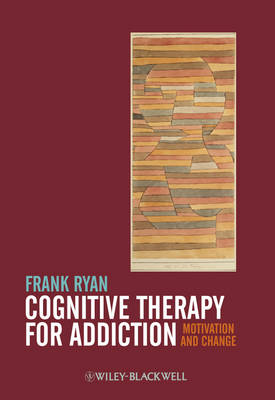
Cognitive Therapy for Addiction
Wiley-Blackwell (Verlag)
978-0-470-66996-9 (ISBN)
- Titel ist leider vergriffen;
keine Neuauflage - Artikel merken
An innovative new approach to addiction treatment that pairs cognitive behavioural therapy with cognitive neuroscience, to directly target the core mechanisms of addiction. * Offers a focus on addiction that is lacking in existing cognitive therapy accounts * Utilizes various approaches, including mindfulness, 12-step facilitation, cognitive bias modification, motivational enhancement and goal-setting and, to combat common road blocks on the road to addiction recovery * Uses neuroscientific findings to explain how willpower becomes compromised-and how it can be effectively utilized in the clinical arena
Frank Ryan is a consultant clinical psychologist in Camden and Islington NHS Foundation Trust in London, UK. An Honorary Senior Lecturer in Faculty of Medicine at Imperial College and an Honorary Research Fellow at Birkbeck, University of London, he is a practicing cognitive therapist and an active trainer, lecturer and researcher.
About the Author ix Preface xi 1 The Tenacity of Addiction 1 Introduction and Overview 1 Discovering Cognition 5 Implicit Cognition and Addiction 6 Neuropsychological Findings 9 Addictive Behaviour is Primary, Not Compensatory 11 Changing Habits is the Priority 14 Diagnostic Criteria 15 Towards Integration 15 Equivocal Findings from Research Trials 16 Time for CHANGE 16 Evolution, Not Revolution 17 Something Old, Something New 18 2 Existing Cognitive Behavioural Accounts of Addiction and Substance Misuse 21 The Evidential Basis of CBT for Addiction 23 Meta-analytic Findings 23 Behavioural Approaches 24 Diverse Treatments Mostly Deliver Equivalent Outcomes 25 What Are the Mechanisms of Change? 26 The Missing Variable? 27 A Dual-Processing Framework 28 3 Core Motivational Processes in Addiction 33 Is Addiction About Avoiding Pain or Seeking Reward? 33 How Formulation Can Go Astray 34 Incentive Theories of Addiction 35 Learning Mechanisms in Addiction 36 Distorted Motivation and Aberrant Learning: the Emergence of Compulsion 41 Wanting and Liking in the Clinic 41 The Role of Secondary Reinforcers 43 Beyond Pleasure and Pain: a Psychoanalytic Perspective 43 Conclusion 44 4 A Cognitive Approach to Understanding the Compulsive Nature of Addiction 45 Theories of Attention 46 Top-Down Influences Can Be Automatic 47 Automatic Processes Can Be Practically Limitless 48 Motivationally Relevant Cues are Prioritized 48 Biased Competition 50 Attention and Volition 51 Appetitive Cues Usually Win 52 Purposeful Behaviour Can Occur in the Absence of Consciousness 53 Attentional Bias and Craving 54 Cognitive Cycle of Preoccupation 56 5 Vulnerability Factors In Addiction 63 Individual Differences in Addiction Liability 63 Personality Traits 63 The Big Five Personality Factors 65 Personality Disorders 66 Affective Vulnerability Factors 67 Brain-Derived Neurotrophic Factors 69 Neurocognitive Vulnerability 70 Findings from the Addiction Clinic 71 From Research to Practice 72 6 Motivation and Engagement 75 Impaired Insight and the Therapeutic Relationship 75 The Sad Case of Julia 80 Conflicted Motivation is the Key 81 Goal Setting and Maintenance 82 The Importance of Between-Session Change 83 Neurocognitive Perspectives on Motivation 83 Motivational Interviewing in Practice 84 Formulating and Planning the Intervention 88 Attributional Biases: the Blame Game 90 Case Formulation 91 Summary 97 7 Managing Impulses 99 Introduction and Overview 99 Structuring the Session 99 Building Resilience 100 Impulse Control 102 Craving and Urge Report 103 Cognitive Processing and Craving 104 Cognitive Bias Modification 105 Attentional Bias in the Context of Addiction 106 The Alcohol Attention-Control Training Programme 108 Modifying Implicit Approach Tendencies 110 Reversing the Bias: Conclusion 112 Brain Training and Neurocognitive Rehabilitation Approaches 112 Clinical Implications of Delayed Reward Discounting 117 Tried and Tested Techniques 119 The Road to Recovery is Paved with Good Implementation Intentions! 125 Neurophysiological Techniques 129 Neuropsychopharmacological Approaches 130 8 Managing Mood 135 The Reciprocal Relationship Between Mood and Addiction 135 Pre-existing Vulnerability to Emotional Distress 137 Negative Affect Due To Drug Effects 141 Stepped Care for Addiction 145 An Integrated Approach to Addressing Negative Emotion 147 9 Maintaining Change 155 Relapse Prevention Strategies from a Neurocognitive Perspective 155 The Importance of Goal Maintenance in the Long Term 158 A Neurocognitive Perspective on Relapse 159 Twelve-Step Facilitation Therapy 161 Implicit Denial 162 10 Future Directions 171 Neurocognitive Therapy 171 Increasing Cognitive Control is the Goal 172 Do We Know Anything New? 173 Appendix Self-Help Guide Six Tips a Pocket Guide to Preventing Relapse 179 Introduction: Why Six Tips? 179 1. Don t Always Trust Your Memory! 180 2. Beware of the Booze Bias ! 180 3. Separate Thoughts from Actions 181 4. Learn How to Distract Yourself 181 5. Willpower Is Sometimes Not Enough 182 6. Beware of the Dog that Doesn t Bark... 182 References 185 Index 201
| Erscheint lt. Verlag | 4.3.2013 |
|---|---|
| Verlagsort | Hoboken |
| Sprache | englisch |
| Maße | 156 x 235 mm |
| Gewicht | 440 g |
| Themenwelt | Geisteswissenschaften ► Psychologie |
| Medizin / Pharmazie ► Medizinische Fachgebiete ► Psychiatrie / Psychotherapie | |
| Medizin / Pharmazie ► Medizinische Fachgebiete ► Suchtkrankheiten | |
| ISBN-10 | 0-470-66996-9 / 0470669969 |
| ISBN-13 | 978-0-470-66996-9 / 9780470669969 |
| Zustand | Neuware |
| Haben Sie eine Frage zum Produkt? |
aus dem Bereich


